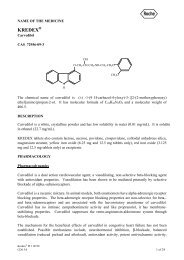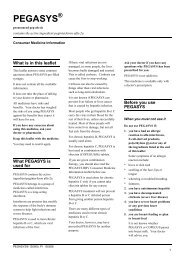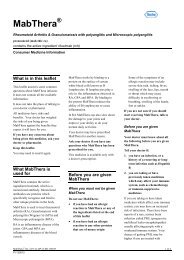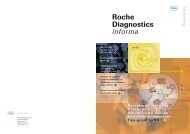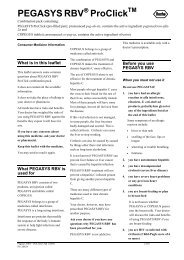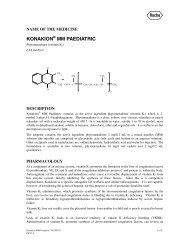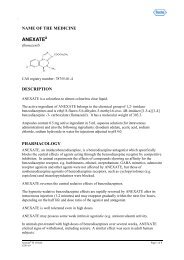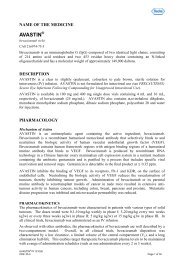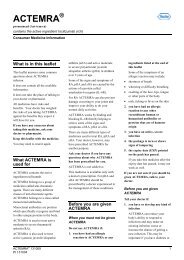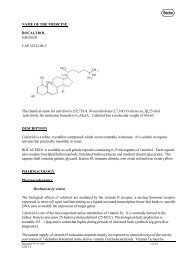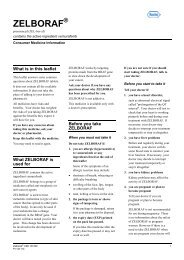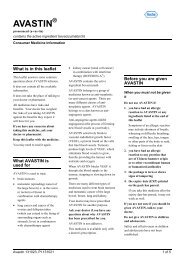Actemra (tocilizumab) Product Information (PI) - Roche Australia
Actemra (tocilizumab) Product Information (PI) - Roche Australia
Actemra (tocilizumab) Product Information (PI) - Roche Australia
You also want an ePaper? Increase the reach of your titles
YUMPU automatically turns print PDFs into web optimized ePapers that Google loves.
Other infrequent and medically relevant adverse events occurring at an incidence of less<br />
than 2% in rheumatoid arthritis patients treated with ACTEMRA in controlled trials<br />
were:<br />
Infections and infestations: cellulitis, oral herpes simplex, herpes zoster, diverticulitis<br />
Gastrointestinal disorders: stomatitis, gastric ulcer<br />
Skin and subcutaneous tissue disorders: pruritus, urticaria<br />
Investigations: weight increased, total bilirubin increased<br />
Blood and lymphaticsystem disorders: leucopenia, neutropenia<br />
Metabolism and nutrition disorders: hypercholesterolaemia, hypertriglyceridaemia<br />
General disorders and administration site conditions: hypersensitivity reaction<br />
Respiratory, thoracic and mediastinal disorders: dyspnoea<br />
Eye disorders: conjunctivitis<br />
Renal disorders: nephrolithiasis<br />
Endocrine disorders: hypothyroidism<br />
Infections<br />
In the 6 month controlled clinical trials, the rate of all infections reported with<br />
ACTEMRA 8 mg/kg + DMARD treatment was 127 events per 100 patient (pt) years<br />
compared to 112 events per 100 pt years in the placebo + DMARD group. In the all<br />
exposure population the overall rate of infections with ACTEMRA was 108 events per<br />
100 pt years exposure.<br />
In the 6 month controlled clinical trials, the rate of serious infections (bacterial, viral and<br />
fungal) with ACTEMRA 8 mg/kg + DMARD was 5.3 events per 100 pt years exposure<br />
compared to 3.9 events per 100 pt years exposure in the placebo + DMARD group. In the<br />
monotherapy study the rate of serious infections was 3.6 events per 100 pt years of<br />
exposure in the ACTEMRA group and 1.5 events per 100 pt years of exposure in the<br />
MTX group.<br />
In the all exposure population the overall rate of serious infections was 4.7 events per 100<br />
pt years. Reported serious infections, some with fatal outcome, included pneumonia,<br />
cellulitis, herpes zoster, gastroenteritis, diverticulitis, sepsis and bacterial arthritis. Cases<br />
of opportunistic infections have also been reported.<br />
Gastrointestinal Perforation<br />
During the 6 month controlled clinical trials, the overall rate of gastrointestinal (GI)<br />
perforation was 0.26 events per 100 pt years with ACTEMRA therapy. In the all<br />
exposure population the overall rate of gastrointestinal perforation was 0.28 events per<br />
100 pt years. Reports of gastrointestinal perforation were primarily reported as<br />
complications of diverticulitis including generalised purulent peritonitis, lower GI<br />
perforation, fistulae and abscess.<br />
<strong>Actemra</strong> ® <strong>PI</strong> 131004 24 of 37<br />
CDS 8.0



